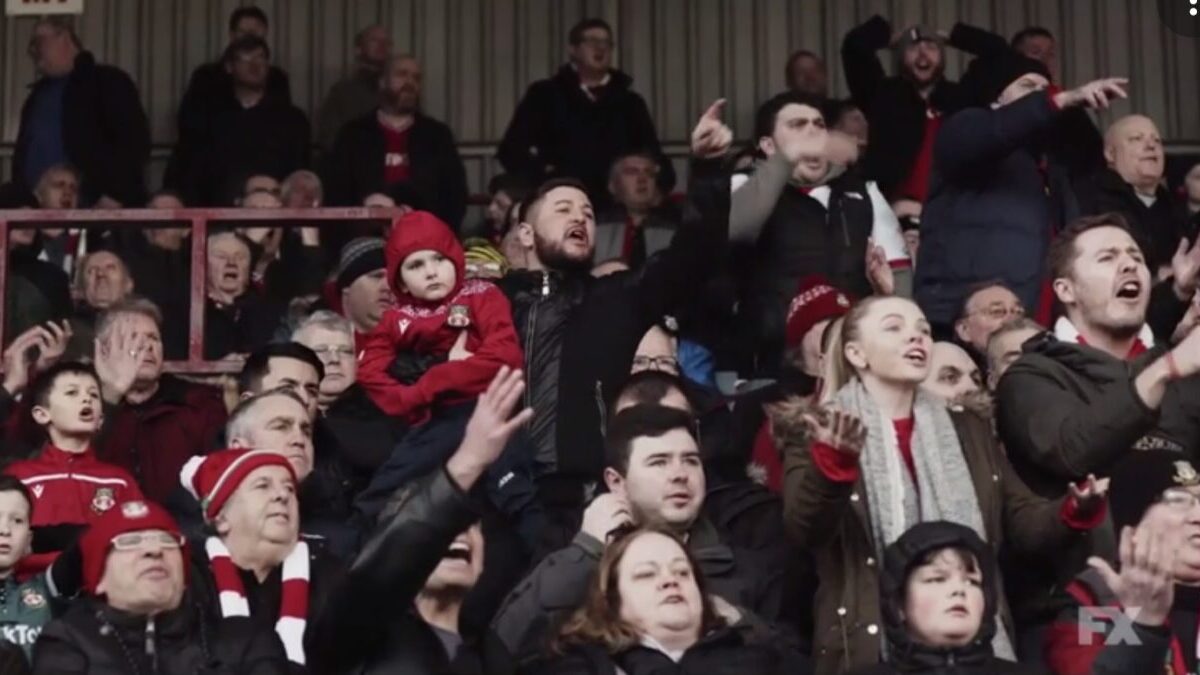The global popularity of soccer has always been a mystery for Americans. With its low scores, slow pace, and vast number of leagues and tournaments, soccer has never been able to seriously compete with other sports. “The Simpsons” captured this perfectly when the town of Springfield is swept up in soccer fever, only to be sorely disappointed with the actual game and resort to rioting.
In Hulu’s new television documentary series “Welcome to Wrexham,” much of the mystery behind soccer is finally dispelled. What starts as something of a vanity project for movie star Ryan Reynolds and TV star Rob McElhenney soon becomes an in-depth examination of the way sports and culture intersect. The two men gradually learn that in purchasing an underachieving football club in Wrexham, Wales, they didn’t just assume the roles of sports franchise owners, but of veritable guardians of a whole community of people.
At the beginning of the series, Reynolds and McElhenney introduce themselves and the project before them. As a lifelong Philadelphia Eagles fan, McElhenney is committed to the idea of sports bringing a city together and inspiring people from all walks of life. When his British friend introduces him to soccer, he considers the possibility of owning one of the more obscure teams in the lower leagues and trying to make it better. And because this requires a great deal of money, he enlists his friend Ryan Reynolds to join him.
As the business side of things is happening in the U.S., the show covers the reaction and thinking of the players, coaches, trainers, janitors, managers, local musicians, fans, and pretty much every person in Wrexham. Most of the town is overjoyed at the prospect of seeing their moribund football team overhauled and transformed into a real contender that could be promoted to a higher league. A few are skeptical first but are won over when the team starts winning.
Learning About Local Culture
While the lavish attention given to so many aspects of the Wrexham football club can become a bit excessive — seriously, a whole episode devoted to hooliganism? — the picture it puts together is fascinating. With each person interviewed, the audience begins to see a former industrial town that has been hollowed out and left with little to take pride in beyond their local soccer team, which itself has suffered a similar decline.
Moreover, each episode reveals just how much of the local culture is invested in these soccer clubs. The best episode is probably “Wide World of Wales,” which gives a rundown of Welsh history and traditions and hardly mentions soccer. At times, this is endearing, as some of the interviewees discuss their lifelong support of the team and how they’ve formed friendships and found joy through it.
At other times, when one is reminded that the Wrexham team, though one of the oldest sports franchises in the world, was never very good, the devotion of the fans can seem desperate. These people should be spending time with their families, praying at church, achieving at their jobs, and practicing their Welsh, not spending so much of their waking life at the local bar, discussing Deadpool’s purchase of their fourth-rate soccer team.
The two frontmen of the series, Reynolds and McElhenney, are fun to watch together. Coming from modest backgrounds themselves, they have a surprisingly strong bond with the working-class folk of Wrexham and want to do right by them. Reynolds, as is his wont, tends to become overbearing and annoying at times, but proves to be adept when it comes to raising money and running a business. McElhenney complements Reynolds’ personality quite well, being the more serious, self-effacing, and cantankerous of the two.
Cruel Reality
That said, for all the banter and warm fuzzies they display, both men are quite intent on winning and moving their new team to the next level. In true American fashion, they show themselves to be rather ruthless in firing players and coaches who don’t perform — their first major action as owners was firing everyone in the club, many of whom had families and loved living in Wrexham. Although this contrast can sometimes seem a little hypocritical, it reinforces the reality of the show.
For the most part, “Welcome to Wrexham” is informative, entertaining, and surprisingly profound. However, it suffers from too many episodes and can sometimes drag (a bit like a typical soccer game). This is not necessarily because of the abundance of material to cover, but more a desire to artificially build up suspense and draw in the audience for a while longer. Occasionally, this is effective, but it becomes exhausting midway through the series when relatively little is happening.
Nevertheless, future seasons of the show would be welcome. It’s good television, and even if Reynolds and McElhenney may not convert Americans to soccer, they at least give the sport its proper dues. It’s more than a game; it’s a world unto itself.









